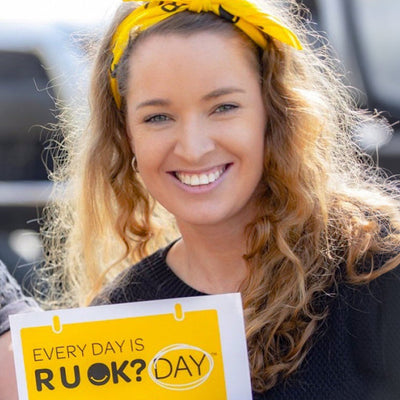Sometimes it’s tricky to know what to say or do when a person you love isn’t acting their usual self (noticeably agitated, distressed, withdrawn, fatigued).
If your mate is in the trenches, for whatever reason - financial stress, work pressure, relationship breakdown - know that is likely hard to speak up. So trust your gut to lay on some additional support.
Ask them a simple yet outright: Are you okay?
“In recent years there has been a lot for Australians to deal with. Many are still feeling the impact of natural disasters and the pandemic, while the cost-of-living increases are adding more stress on those who are already struggling. It’s important for us to recognise that the people we really care about may be feeling ongoing effects, long after something has happened to them, so let them know you’re still here to really hear.” Katherine Newtown, CEO at R U OK?
Before offering your ear/embrace/other half of your LCM it’s important to acknowledge how you’re feeling too. Ensuring you have the time and energy and a positive headspace to be able to respond and help navigate next steps (if needed). Pick your moment wisely.
Simple steps that could change a life:
- Ask
- Choose somewhere relatively private and comfy
- Be relaxed and friendly in your approach
- Encourage them to open up by asking how are you? or what’s been happening?
- Mention specific moments or actions that have made you concerned for them
- Listen
- Take what they say seriously
- Don’t interrupt or rush the conversation
- Don’t judge their experience or actions
- Acknowledge that things seem tough
- If they need time to think, sit patiently in silence
- Help to delve deeper with questions like how long have you felt that way?
- Show that you’ve listened by repeating back what you’ve heard, in your own words
- Encourage Action
- Decipher whether this has happened before, and how they got out of feeling this way
- Discuss how you can be of support
- Share your experience to show they aren’t alone
- If they’ve been feeling really down for two weeks (or more) encourage them to see a health professional
- Some conversations are too big for family and friends to take on alone, so if they are at risk, please find expert help immediately
- Check In
- Stay in touch - genuine care and concern makes a real difference
- Make a note in your diary to call in a couple of weeks, if not sooner
- See if they’ve found (or are exploring) a better way to manage the situation
Immediate support services for those struggling:
13 11 14
Call Lifeline 24/7 for crisis support and suicide prevention services. Text support is also available: 0477 13 11 14.
1300 22 4636
Call Beyond Blue 24/7 for advice, referral and support from a trained mental health professional.
1300 659 467
The Suicide Call Back Service offers 24/7 free counselling and support for people at risk of suicide, carers and bereaved.
1300 78 99 78
Call Mensline 24/7 for telephone and online support for men with emotional health and relationship concerns.
1800 55 1800
Kids Helpline is 24/7 free and confidential phone and online counselling service for young people aged 5-25.
13 92 76
13 YARN is a 24/7 national crisis support line for Aboriginal and Torres Strait Islander people.
1800 184 527
QLife offers phone and online anonymous LGBTI support and referral. 3pm - midnight local time every day.















Comments